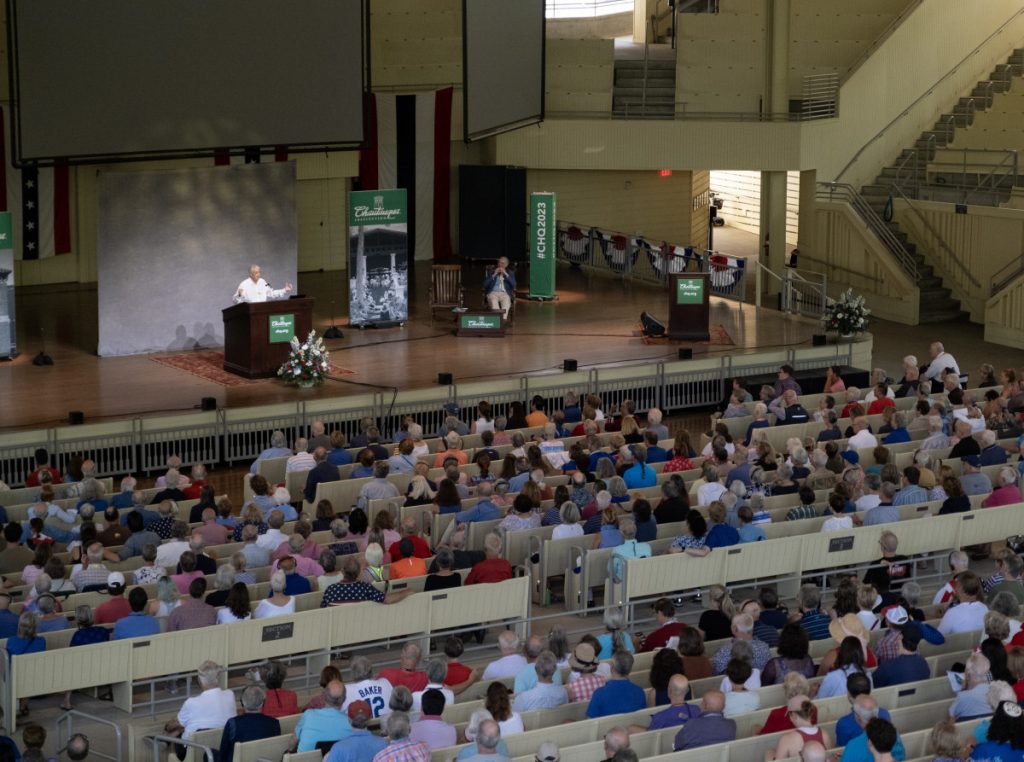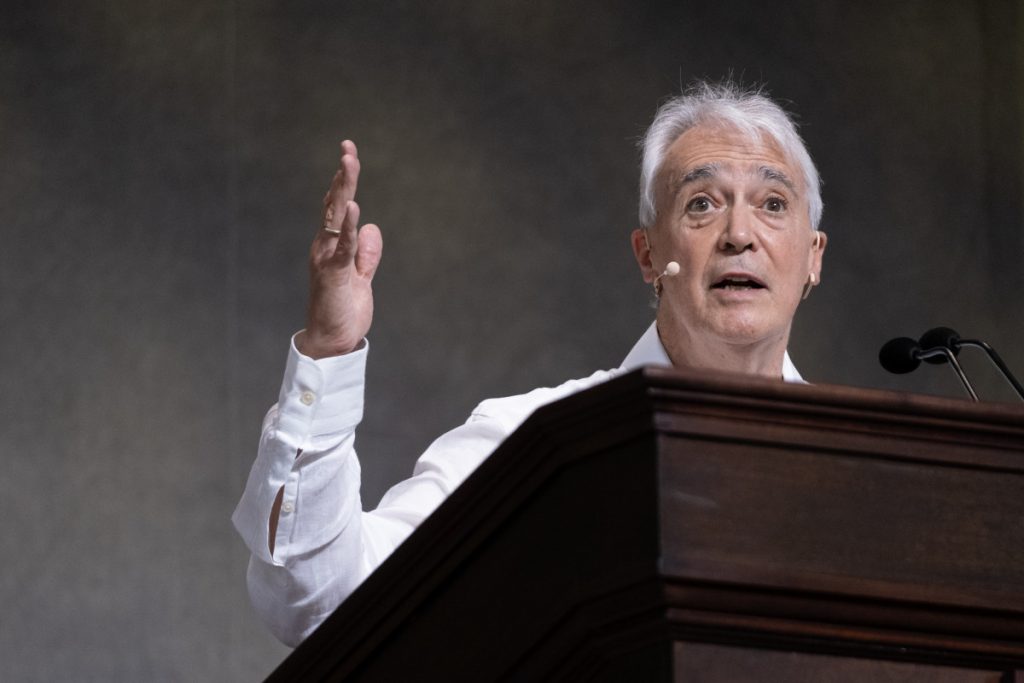
Alton Northup
Staff Writer
As Scott Simon walked onto the Amphitheater stage to a live rendition of “Take Me Out to the Ballgame” on the Massey Memorial Organ, one might have suspected they were at the Chicago native’s beloved Wrigley Field, and not Chautauqua Institution.
Simon, the host of “Weekend Edition Saturday,” continued the Chautauqua Lecture Series Week Two theme, “Games: A Celebration of Our Most Human Pastimes,” with a lecture of the same title at 10:45 a.m. Tuesday – the Fourth of July – in the Amp.
Simon joked that despite his longtime affiliation with NPR, which he suspects may provide more coverage to the Iditarod than the Super Bowl, he still pays attention to mainstream sports; he has written several books on the subject, including My Cubs: A Love Story. Whether he is covering a story in his Midwest hometown or a war zone in the Middle East, sports seem to follow him everywhere.
He recalled sitting in a soccer stadium in Kabul, Afghanistan; a stadium that, during Taliban rule, held executions every Friday.
“This place of joy and celebration and frustration … became a killing field,” Simon said.
On the day he happened to be sitting in that stadium, the celebrations had returned. The aptly named Kabul United were hosting British paratroopers in a friendly match as the Taliban withdrew from the country.
At one point in the game, a British trooper removed her beret to wave to the crowd. The crowd went wild, Simon said, at the sight of the woman’s hair.
“I still get emotional when I think about it,” he said. “For the rest of the game, there were Afghan women all over the stadium who would stand up one by one and take off their burqas.”
Kabul would go on to make the first goal of the match and, despite losing 3-1, the score did not matter. The fans were not cheering for a win, Simon said, but for their liberation.
“The first goal reminded many in the crowd that amazing things are possible,” he said.

When Simon returned to file a story about his experience, it never aired – the assassination of Abdul Rahman, then-interim minister for air transport and tourism, crowded the news cycle. But there is not a week that goes by when he does not think of it.
“The story that seems so urgent and critical today may evaporate into what our friend Salman Rushdie so aptly called ‘the annihilating whirlpool of history,’ ” Simon said. “The story that goes unnoticed today may become the inspiration for a work of art, a family story, an investigation into life that endures and inspires and instructs.”
Those unnoticed stories are common in sports: Buffalonians who believe embracing the snow makes them the Bills’ defensive line, Clevelanders who found the key to a championship in their own backyard with LeBron James, women emboldened by the victories of Billie Jean King, or the Kansas City Monarchs’ achievement in the face of segregation.
While covering the Siege of Sarajevo during the Bosnian War, it was the Chicago Bulls’ Dream Team that inspired Sarajevans.
Simon described the scene he faced, riding through the city in a French personnel carrier, bullets stinging its sides as it went. When soldiers patted him down at a sandbag-covered checkpoint, he heard a small voice ask him where he was from. Simon answered.
“I love Chicago,” the teenager replied. “Michael Jordan. Chicago Bulls.”
It was an indication to Simon that the meaning of his city was not only changing, but separating from its geographic boundaries. The Bulls, with a team consisting of athletes from rural and suburban United States, Canada, Croatia and Lebanon, were now a symbol of diversity.
“This was a team that reflected the world and a city that reflected the world,” he said. “And I think it said to Sarajevans, ‘Look what a free and diverse group of people can do if you give them the chance.’ ”
Simon sees those same ideals in the French national soccer team. He recalled a trip with his wife, a French expat, to the country’s embassy in D.C. The pair watched the team play in the World Cup, and he recognized that players such as Théo Hernandez, Ibrahima Konaté, Youssouf Fofana and Kylian Mbappé are redefining what it means to be French at a critical point in the nation’s history.
“Names from all over the world, but born in France, (are) in the visible reflection of France’s moral character and citizenry,” he said.
As those gathered sang “La Marseillaise” in unison before the game, “I felt we became La République,” Simon said.
His affinity for sports, especially baseball, started as a child through his familial ties. Jack Brickhouse, the play-by-play announcer for the Chicago Cubs, was his godfather; Charlie Grimm, the manager for the 1945 World Series Chicago Cubs team, was his uncle.
With a family like this, Simon said, Wrigley Field game nights can be very boring for his children as he recalls his own memories. But it also instilled in him a reverence for the Cubs’ legacy.
When it looked as though the team could be in the running for its first World Series championship in 108 years, Simon had to be there for the chase – including tossing the first pitch at the July 31, 2016, game between the Cubs and the Seattle Mariners.
By the third inning, the Cubs were down 0-6. Seven pitchers were cycled in and Simon began to worry the team might be desperate enough to call him in as the eighth. The team, however, managed to make a comeback, and with just one strike left in the 12th inning they needed a miracle.
That is when pitcher Jon Lester, who by chance was wearing the same number on his jersey as Simon, came off the bench. Lester stepped up to the plate with a .102 batting average and laid a bunt down to cap a wild comeback for the Cubs.
As fans chanted “Go Cubs, Go!” and the Cubs Win flag unfurled, Simon could only think to himself, “that is so Cubs-like.”
The team would go on to have a 13-game win streak, culminating in a 2016 World Series win against Cleveland.
Simon said he knows sports can be trivial, but pivoted back to his earlier point about their ability to inspire people, movements and even countries.
When Jackie Robinson debuted in 1947 as the first black player in Major League Baseball, the United States was fresh from defeating a racist dictatorship with a segregated army of its own. And while more Black players would join the league months later, Robinson had to enter Ebbets Field alone.
“(Branch Rickey, the Brooklyn Dodgers general manager,) knew that the drama of a lone man staring down bigots, walking tall and determined in the face of hatred, would not only break barriers in baseball but give human form to bravery,” Simon said.
Despite his belief in the power of sports to inspire, Simon argued there are three major problems currently threatening that power.
Athletes playing full-contact sports, he said, are increasingly at risk of deteriorating health. Football helmets are now head-ramming weapons and knockouts in boxing can turn a once-bouncing Muhammad Ali into a shell of his former self.
As we study the effects of concussions and other injuries, “we now know and we can follow the damage these sports can inflict on participants, and, of course, families,” Simon said.
He questioned how attractive sports would be if what he called “the wreckage” was limited. One thing that does seem to be increasing viewership, however, is legal sports gambling.
Simon said some argue that opening up salary caps would remove motives for throwing games or that it would be beneath players to jeopardize their careers; his rebuttal is that the most infamous scandals in sports betting involved shaving points.
“I invite you to review history, and not just sports history but finance, politics, industry, monarchy – and you tell me that you’re satisfied (that) people with wealth and means have no motive to steal.”
His final concern is what he called “sports washing” – authoritarian governments using sports to clean up their image.
“It’s using sports to make an oppressive, totalitarian regime seem as if they believe in rules, fair play and the freedom to participate,” Simon said.
It has come to the point, he said, where one has to rhetorically ask if the Sochi Olympics stopped Russia’s annexation of Crimea and expanded invasion of Ukraine, if the Beijing Olympics freed the Uighurs and if the World Cup saved the lives of migrant workers in Qatar.
“There has been a depressing tendency to locate major sporting events in authoritarian regimes,” he said.
Does that mean sports fans have to do the moral calculations that executives and owners refuse to do? He said fans like him may have to question their own responsibility, and that athletes can no longer avoid the issue.
“Sports can be something different; it can be a source of unity in a divided world,” he said. “When we cheer for a team we love despite setbacks, … we cheer in a chorus of voices that can unite us in a song of celebration.”




